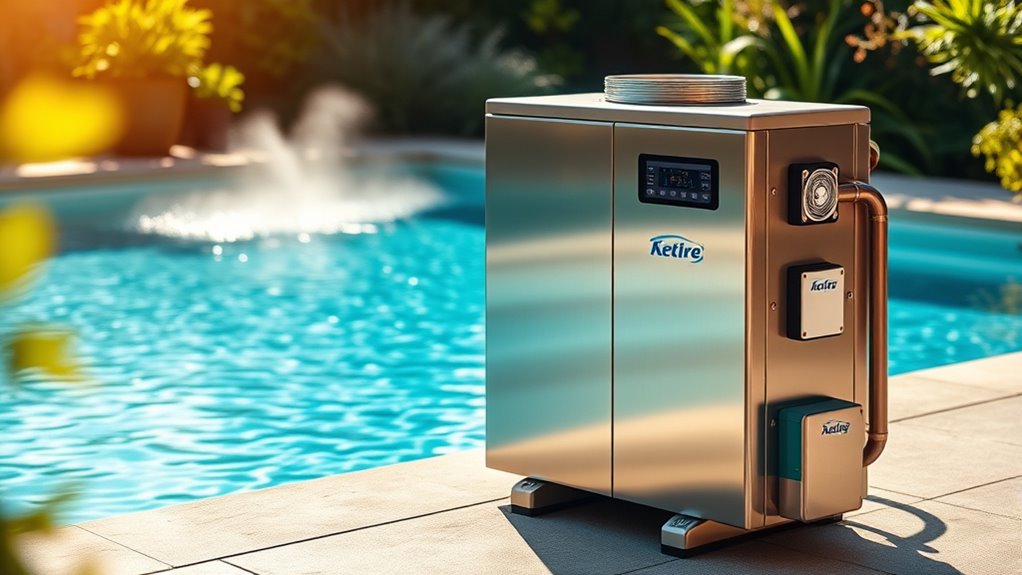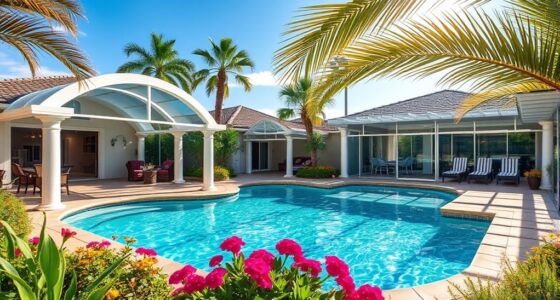Pool heat pumps use advanced technology to efficiently heat your swimming water, extending your swim season. They work by collecting heat from the ambient air through an evaporator coil and transferring it to your pool water via a heat exchanger. With lower energy consumption compared to traditional heaters, they are eco-friendly and cost-effective in the long run. Curious about the components that make this technology work? There’s more to discover about how they operate.
Key Takeaways
- Pool heat pumps function by extracting heat from the ambient air and transferring it to pool water, similar to a refrigerator in reverse.
- The main components include an evaporator coil, compressor, heat exchanger, and expansion valve, working together for efficient heating.
- High coefficients of performance (COP) indicate that pool heat pumps use less electricity compared to traditional electric heaters, making them more energy-efficient.
- Various types of heat pumps, including air-to-water, solar-assisted, and hybrid systems, offer flexibility depending on specific heating needs and environmental conditions.
- Regular maintenance and automated temperature controls enhance efficiency and safety, ensuring optimal performance and longevity of the system.

When you’re looking to extend your swimming season, pool heat pumps offer an efficient and eco-friendly solution. These devices work by harnessing ambient air heat to warm your pool water, making them a sustainable choice. Operating similarly to a refrigerator but in reverse, pool heat pumps effectively transfer heat from the air to your pool, allowing you to enjoy a comfortable swim year-round.
The basic components of a pool heat pump include an evaporator coil, a compressor, a heat exchanger (or condenser), and an expansion valve. The evaporator coil acts as a heat collector, absorbing warmth from the surrounding air. This heat then transfers to the refrigerant, which the compressor compresses to raise its temperature. The hot gas moves to the condenser, where it releases its heat into the pool water. After this process, the refrigerant cools and becomes a liquid again, ready to begin the cycle once more.
The efficiency of pool heat pumps is a considerable advantage. They can achieve high coefficients of performance (COP), meaning they use considerably less electricity than traditional electric heaters. While the initial installation costs might be higher compared to gas heaters, the long-term savings make them more cost-effective.
Pool heat pumps offer remarkable efficiency, utilizing less electricity than traditional heaters and providing long-term cost savings despite higher initial installation costs.
Plus, their eco-friendly nature contributes to reduced greenhouse gas emissions, aligning with the growing trend toward sustainability. Government incentives may also be available in some regions for installing these systems, making them even more attractive.
There are various types of heat pumps on the market. The air-to-water heat pump is the most common, utilizing air as the heat source. You can also find solar-assisted models that combine solar power with traditional heat pump technology.
Geothermal heat pumps, while rarely used for pools, draw from the earth’s heat, and hybrid systems can combine different heat sources for ideal efficiency. High-efficiency models featuring advanced technology are becoming increasingly popular, offering superior performance.
Safety features in pool heat pumps are designed to guarantee reliable operation. Automated temperature controls help maintain your desired water temperature, while protection systems prevent damage from freezing or overheating. Additionally, regular maintenance can enhance the efficiency of the refrigeration cycle by up to 70% efficiency improvement, ensuring your pool heat pump operates at its best.
Many models include ground fault circuit interrupters (GFCIs) for electrical safety and components that resist corrosion in pool environments. Some systems even provide maintenance alerts, guaranteeing your heat pump operates at peak efficiency.
Frequently Asked Questions
How Much Energy Do Pool Heat Pumps Consume?
Pool heat pumps typically consume between 5 kW to 6 kW per hour.
Your actual energy usage can vary based on factors like pool size, desired temperature, and ambient conditions.
Generally, you’ll find that they’re more efficient than gas heaters, producing more heat per unit of electricity consumed.
Expect daily energy costs to range from $1.20 to $1.80, depending on local electricity rates and seasonal changes.
Regular maintenance helps optimize efficiency and manage consumption.
What Is the Average Lifespan of a Pool Heat Pump?
The average lifespan of a pool heat pump usually ranges from 10 to 20 years.
If you guarantee high-quality installation and regular maintenance, your pump can last even longer.
Factors like climate and operational demands also play a role in longevity.
Keep an eye on performance and any signs of wear, as proactive care can help you maximize its lifespan and avoid costly replacements down the line.
Can Pool Heat Pumps Work in Cold Climates?
Imagine stepping into your pool, even when the frost bites at your nose.
Yes, pool heat pumps can work in cold climates! They efficiently operate in temperatures as low as -5°C (23°F), maintaining warm water for your enjoyment.
With advanced features like defrosting mechanisms and high Seasonal Coefficient of Performance (SCOP) ratings, these pumps keep your pool inviting, ensuring you can swim comfortably, regardless of the chill in the air.
Enjoy your slice of paradise!
How Do I Maintain My Pool Heat Pump?
To maintain your pool heat pump, start by inspecting and cleaning the unit regularly.
Check and replace air filters as needed and lubricate moving parts like fan motors.
Test the thermostat for accuracy and inspect for leaks.
Confirm proper airflow and clean the coils for maximum heat transfer.
Cover the unit during harsh weather and schedule routine maintenance sessions to extend its lifespan.
Following these steps keeps your pump running efficiently.
What Size Heat Pump Do I Need for My Pool?
Choosing the right heat pump for your pool is like finding the perfect key for a lock—it needs to fit just right.
To determine the size you need, consider your pool’s volume, surface area, and the desired water temperature. Calculate the temperature rise and adjust for local climate factors like wind and humidity.
Consulting a professional guarantees you get an accurate assessment tailored to your unique swimming environment.
Conclusion
In the world of pool heat pumps, you’re not just heating water; you’re creating a personal oasis, much like a serene retreat in a hidden garden. By embracing this innovative technology, you’re ensuring every swim feels like a dip in a sunlit paradise, no matter the season. So, as you lounge by the pool, remember that with a heat pump, you’re transforming your backyard into a haven of warmth and relaxation, inviting you to plunge in anytime you wish.









